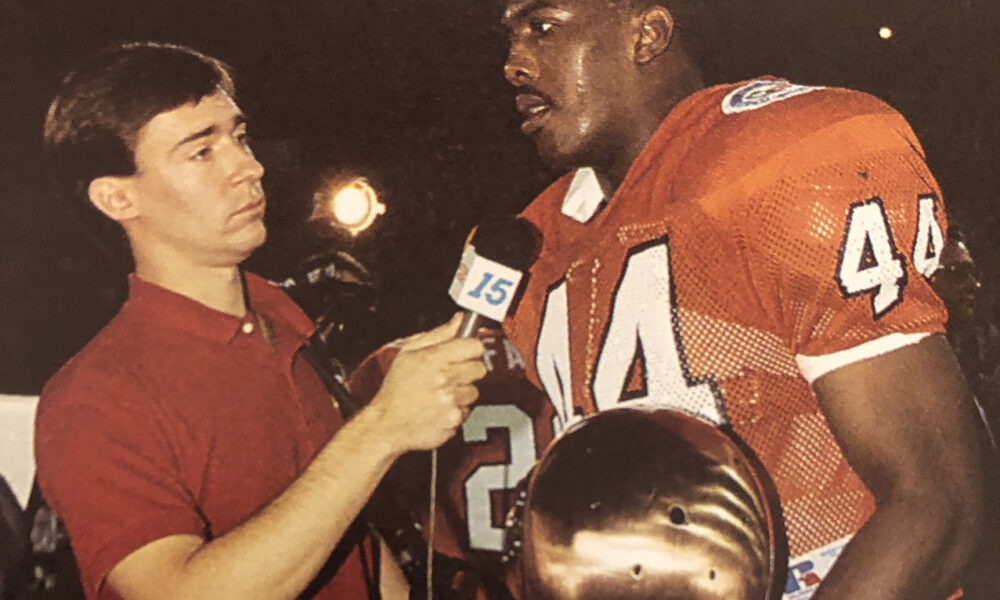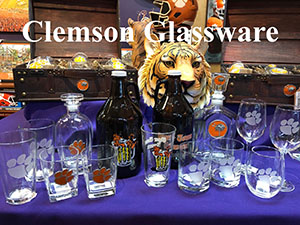By mid-season in 1989, Clemson’s opportunity to win a fourth consecutive ACC Championship had slid through the cracks. Losses to upstarts Duke and Georgia Tech, knocked the Tigers out of the running for a championship.
At 5-2, the players called a meeting with head coach Danny Ford and expressed their concerns and asked the coaches if they could just go back to playing football and having fun. So, that is what they did.
The Tigers went on to win the final four games of the regular season by outscoring NC State, Wake Forest, North Carolina, and Duke by a combined margin of 154-23. After its 45-0 win over rival South Carolina to close the regular season, No. 14 Clemson accepted a bid to play 17th-ranked West Virginia in the 1989 Gator Bowl, which was played on December 30, 1989.
The Mountaineers were led by Heisman Trophy Finalist Major Harris, who the year before took West Virginia to the national championship game. Harris was a dynamic dual-threat quarterback who was decades ahead of his time.
Harris came into the Gator Bowl ranked eighth nationally in total offense and ninth in passing efficiency.
“He was second in the Heisman running at the time. As a player, you always have pride and you want to play well,” former Clemson linebacker Levon Kirkland said. “Another thing is when somebody keeps telling you how good another guy is … and that is what we heard for two whole weeks. How good Major Harris was. It was almost impossible to stop him and blah, blah, blah.”
The Clemson defense was mad. They felt like they were one of the best defenses in the country and no one was giving them respect for how good they were.
In 1989, Clemson’s defense was one of the best in the country. They allowed just 263.3 yards per game and teams averaged just 96.6 yards on the ground. They gave up just 11.5 points per game.
The Tigers’ defense was tired of hearing about how great Major Harris was and how they would not be able to stop him.
“We just kind of looked at him and said, ‘They don’t know who we are. The nation does not know who we are. They don’t understand how good we are,’” Kirkland said. “We basically knew, as long as we rushed our lanes, we could contain this guy. We felt like we had an overall defense that he was ‘the guy’ and he was dangerous, but if we rushed him the right way, we could easily defeat him and that is what we did.”
That is what they did, though it did not start out that way.
With Harris leading the way, West Virginia took its opening possession and marched 96 yards for a touchdown. Harris picked apart the Tigers’ defense and capped it with a 12-yard touchdown pass to wide receiver James Jett.
“They got that first drive on us and we kinda settled down,” Kirkland said.
Clemson’s defense took over the game is what they did. The Mountaineers managed just 141 yards of total offense the rest of the night.
Kirkland, the game’s MVP, led the Tigers with nine tackles, a five-yard sack, a caused fumble and three quarterback pressures.
“After that, once I got that first sack on him, we just started rolling. They just could not match our speed at the time,” said Kirkland, who was added to Clemson’s Ring of Honor at Death Valley last fall.
While the defense was controlling the game, the offense got going too. The Tigers scored 10 points in the second quarter thanks to a Chris Gardocki 27-yard field goal and later got a one-yard Wesley McFadden touchdown with 2:54 to play before halftime.
In the fourth quarter, Clemson took control of the game when Joe Henderson went in from four yards out with 11:43 to play and then a couple of possessions later defensive tackle Chester McGlockton stripped sack Harris and recovered the loose ball in the end zone for a touchdown with 8:08 to go.
Gardocki added a 24-yard field goal with 3:16 to play to finalize the Tigers’ 27-7 victory.
As for Harris, Clemson’s defense forced him to fumble three times in the second half. He was sacked several times and was hit all night. The Heisman Finalist had the worst game of his college career, completing just 11-of-21 passes for 119 yards and rushing 11 times for 17 yards.
Harris turned the football over four times in all, while the West Virginia offense was held to 237 total yards.
“We beat him up,” Kirkland recalled. “I remember one time, Wayne slammed him to the ground. One time he sprinted all the way to the right and then he came back and I was waiting on him and I was like, ‘Once he throws this ball, I am going to unload on him.’
“So. I just kept my feet chopping. I had a nice little angle on him, so he could not get away. He came at me and he kind of hesitated and threw it. Once he threw it, I am like, Bam! I laid into him and I think later he said, ‘I think that is the hardest I had ever been hit in my life.’ He was not used to another defense playing the way we did and getting after him the way we did.”
Clemson finished the 1989 season with a 10-2 record, the program’s third straight, and ranked 12th in the final AP Poll. It turned out the 1989 Gator Bowl was the last game Ford coached at Clemson.
—photo courtesy Clemson Athletic Communications
Clemson fans, now is the time to support the local businesses.
A great gift for any Tiger fan. Just one of many great items available from Clemson Variety & Frame

